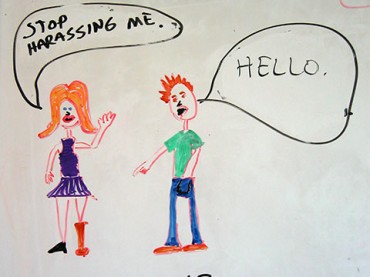
OPINION
Missouri state lawmakers deserve plaudits for pushing expanded speech rights on college campuses, as The College Fix has reported.
Should they return for an encore, lawmakers might take a gander at the broad, vague and sometimes illogical harassment policies that remain on the books at several state universities.
The rules, which theoretically punish actions as minor as “offensive jokes” or commenting on someone’s clothing, could put faculty in the line of fire as well.
The Columbia Daily Tribune reported last week that the University of Missouri Faculty Council was recently briefed about draft procedures for “handling cases of professors being accused of sexual discrimination under Title IX,” including a “trial-like hearing” governed by the weak “preponderance of evidence” standard.
And though the University of Missouri’s Title IX coordinator quickly dismissed a harassment complaint against a fraternity member in a Teletubby costume last summer, the fact that a complaint was brought at all shows how ambiguous the policies can be.
For more than four years, the University of Central Missouri has maintained a convoluted harassment policy that says subjecting a member of a “protected class to repeated criticism or verbal abuse but not doing so to similarly situated non-class members” should be considered a form of harassment.
Perhaps you can verbally abuse someone based on race or gender, as long as you do it to multiple races and genders?
Other forms of harassment at the school include making “offensive jokes,” “name calling,” “ridicule” and “mockery.” The university even considers “offensive objects or pictures” as forms of harassment.
Theoretically, this could subject professors to scrutiny for their curricular decisions: Images of fertility statues in an art or history class could be considered “offensive pictures,” not to mention photographs of Holocaust survivors in a World War II class.
In a judicial setting, a person needs “standing” to bring a claim, but not at Central Missouri: Its policy states that “the victim does not have to be the person harassed, but can be anyone affected by the offensive conduct.”
Because the university includes “requests for sexual favors” as sexual harassment, asking someone for sex is technically only allowed if they say “yes,” as The Fix has previously noted.
The university did not respond to requests for comments.
The University of Missouri-Columbia also adheres to a broad and vague harassment policy.
Its Equity Office defines sexual harassment as “unwelcome verbal or physical conduct of a sexual nature,” including “leering or ogling” or commenting on someone’s “clothing, appearance or sexual experience.”
Applied consistently, that would prevent a chastity club from meeting on campus or even complimenting the way someone dresses. The code also bans “suggestive or insulting sounds” or “off-color jokes or obscene gestures.”
The Equity Office, Office of Student Conduct and Title IX Office did not respond to requests for comment.
Even at Missouri State University, which promises to judge sexual or other harassment by the “objective standard of a reasonable person,” the “reasonable” standard is notably absent in other policies.
Its student handbook defines harassment as anything creating a “intimidating, hostile, or offensive learning, working, or living environment,” and lists “unwelcome or inappropriate” jokes or comments as examples of sexual harassment.
Even declining to act is verboten: “Unwillingness to train, evaluate, assist or work with a person” is listed as an example of sexual harassment.
Is is any wonder that students continue to sue their universities for selective enforcement of inscrutable harassment codes?
College Fix contributor Matt Lamb is a student at Loyola University-Chicago.
Like The College Fix on Facebook / Follow us on Twitter
IMAGE: Jeff C/Flickr






Please join the conversation about our stories on Facebook, Twitter, Instagram, Reddit, MeWe, Rumble, Gab, Minds and Gettr.